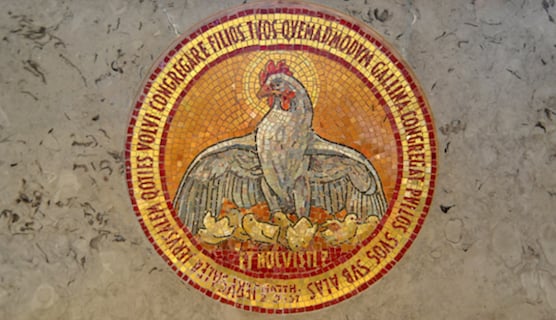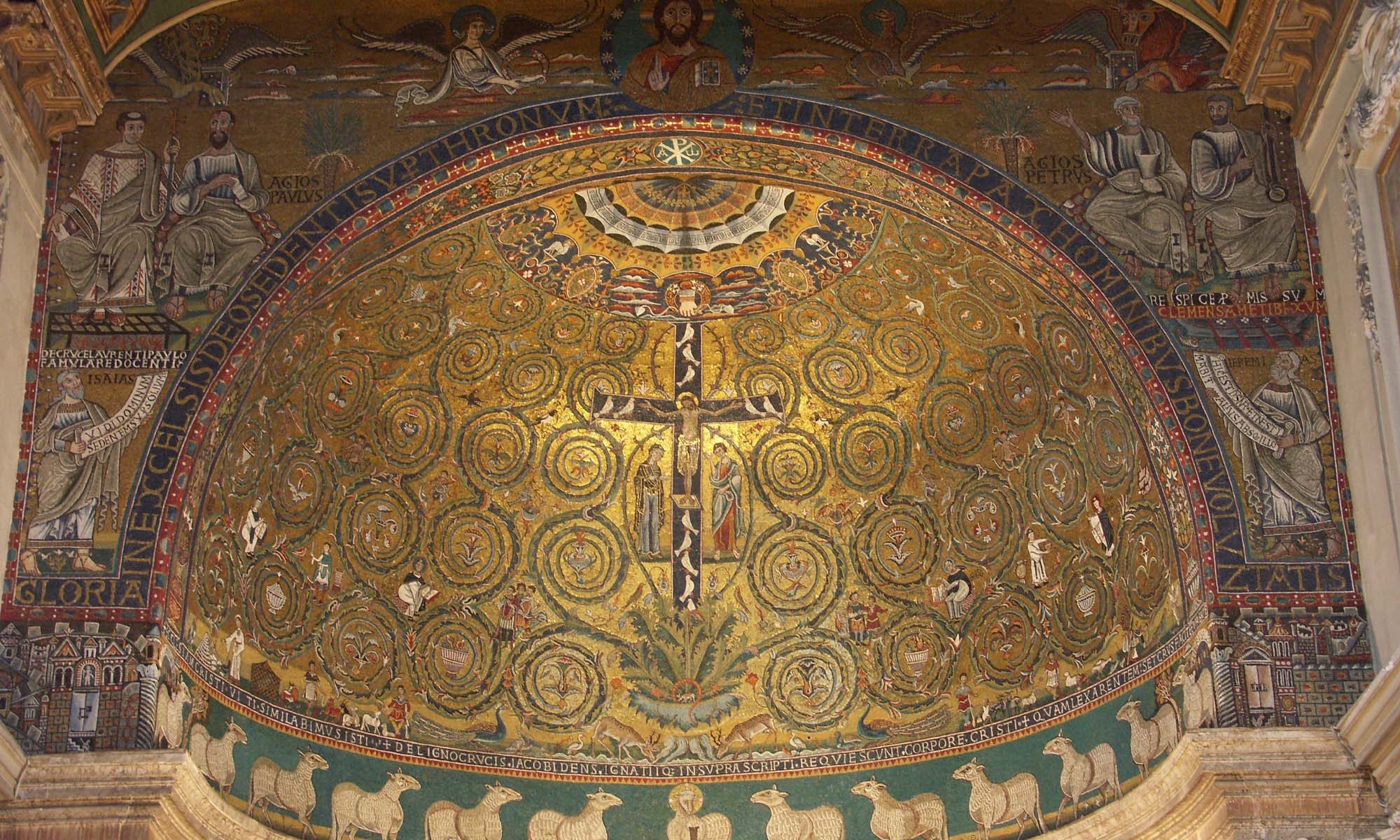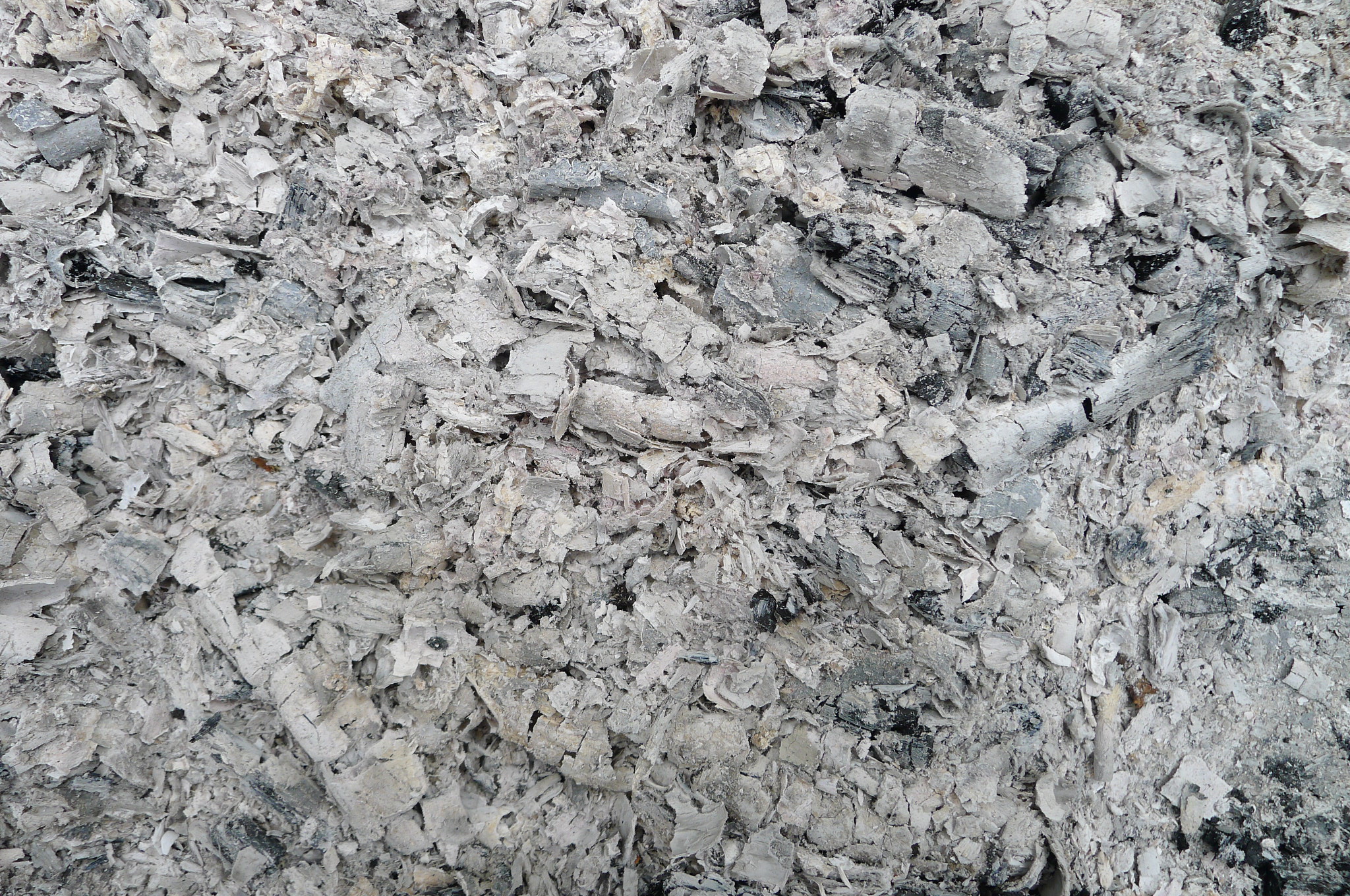
You can find below the text of the sermon I preached at St. Paul’s last Sunday. A translation into Spanish follows.
Genesis 15:1-12, 17-18
Psalm 27
Philippians 3:17-4:1
Luke 13:31-35
During Lent we are on a journey that allows us to consider things with a fresh look. The changes in the liturgy and the new disciplines we are invited to take up help us to re-ground our faith in God rather than in our habits or our ready-made answers; especially the religious or cliquish ones. Lent is a time when we are all invited to reconsider how we think about and experience our belonging to each other and to God. For us here at St Paul’s Lent also involves considering anew the bonds of Christian fellowship which have been put under duress during this pandemic. During our Lenten journey our sense of belonging will be redefined and refined by Christ’s redeeming presence and the experience of our communion with him and with each other.
Today’s Gospel invites us to have a new look at our mission as Christians and as a Church as we listen to Christ talking about his own mission of healing and reconciliation. Let us hear Christ replying to a group of Pharisees who approach him to tell him that Herod wants to kill him: ‘Listen, I am casting out demons and performing cures today and tomorrow, and on the third day I finish my work. Yet today, tomorrow, and the next day I must be on my way, because it is impossible for a prophet to be killed outside of Jerusalem.’ His answer might sound strange in our ears because he seems to say that he has to do two things at the same time; to heal and to undertake a journey to Jerusalem. He suggests that he is pacing out his daily acts of healing alongside his daily journey towards Jerusalem, towards his Cross. For Jesus, in fact, “casting out demons”, “performing cures” and fulfilling his Father’s will – which entails dying on the Cross– are all the same thing. The journey, the healing and the Cross are one. The image of the hen that Jesus employs to illustrate his relationship to us conveys both a sense of maternal protection and the idea of sacrifice, because a hen would let herself be eaten to protect her chicks. For Jesus, being fully consumed both in love and service for God and also for his brothers and sisters is exactly the same thing.
The same is true for us. We cannot be in communion with God if we are not yearning to be in communion with everyone and the whole of Creation. We cannot be in communion with God if we are not particularly attentive to the infirmities and sufferings of our brothers and sisters as we journey on our way. We cannot belong to God if we don’t belong at the same time to each other. We cannot belong to God if we are not aware from the very start that our true reality is one of communion, and that this communion is also a way of the cross. Communion, and the Christian community it fosters, is not a human project: it is a gift of God that demands our loving response. If many evil powers can destroy and conquer our hearts and our minds, it is because they instill in us the idea that this sort of communion isn’t real. They make us indifferent not only to our own sufferings, but also to the suffering of others. They make us indifferent to the cross of Christ – just as Paul says. They make us indifferent to the life-giving communion and fraternity that stems from this cross. The enemies of the cross feed us with the poisonous idea that there are essential differences between us, between our individual sufferings and our aspirations, that we cannot be in communion for x or y reasons, that we essentially and exclusively belong to a certain race, nation, ideology, social class, language and not radically to each other. All these powers don’t want us to experience the reality that we belong primarily to one another in God before and against everything else and every other power. All the evil powers of this world, including the powers who inspired in Herod the desire to kill Jesus, want us to believe that living in communion is not our primordial identity, that living in communion is not what we are destined to be and it is not where we belong.
Fortunately for us, God is never tired of calling us back under his wings, of fighting back for us. The great mystery which binds us together—not just those of us who are present here this morning, the mystery that binds together all the saints on earth and in heaven and indeed the whole of creation itself, is this. It is the mystery of communion. This mystery is going to become visible very soon, just here. This mystery is the shadow of God that covers us and allows us to grow into the full stature of Christ. In fact, if the Communion were an animal, it would probably be a hen. At this altar you are welcome under Christ’s wings, because he gives himself to you in his body and blood at the moment when he opens wide his wings on the Cross to embrace the whole of our humanity. In the mystery of communion nothing is left untouched, nothing that needs attention is left unattended. Everything and everybody are gathered in. As you come to this table, remember that you can bring with you everything that you are, in your mind, imagination and heart in order to communicate with him. You can bring all people you remember who are alive or asleep, suffering or joyous. Under his wings you can also communicate to him your doubts, your anger, and your fears. Here everything is joined in Christ and consummated in him. Here every creature is invited to dwell and warm themselves in his real presence and under the shadow of his wings. Even if we are hunted by the foxes of this world, just like a brood of chicks, we can still come together to this altar and find refuge in Christ’s body. This tiny little crumb of bread opens to us the depths of God’s intimacy. Here, in our midst, we can welcome him and welcome each other in his name. Our intimacy with him makes us all one. And when we recite the words of the Sanctus “Blessed is he who comes in the name of the Lord” while crossing ourselves, we won’t know if we are talking about ourselves or about him. In communion we can welcome each other because we truly become one spiritual body. This great intimacy, this great proximity to God and to one another protects us from the foxes of this world.
I’ll soon leave this perch and we will all depart from this henhouse where Christ has gathered us under his wings. Soon we will leave Jesus’s nest. Yet we can bring his presence and his warmth to the world, when, just as a chick leaves its mother, we will go out to welcome, protect, defend, feed and help others. If you’re still looking for some Lenten discipline, why not be for someone else the nest you have found here, in the intimacy of Jesus’s presence and in the company of this communion? This can be as simple as talking to someone with whom you’ve never talked, or listening to them. It can be as simple as inviting someone for dinner, coffee, or a walk. Or simply take some time to be silent with yourself. These are but a few of the ways in which we can communicate God’s intimacy to each other as Christ the Hen communicates it to us in the sacrament of communion. All these simple signs of divine intimacy will make us a people with whom people want to belong. And very humbly, Christ’s love and peace will be extended through your bonds of friendship, even to the most desolate and lonely of hearts.
En español:
Durante la Cuaresma estamos en un camino que nos permite considerar las cosas con otros ojos. Los cambios en la liturgia y las nuevas disciplinas que estamos invitados a asumir nos ayudan a volver a cimentar nuestra fe en Dios más que en nuestros hábitos o nuestras respuestas preparadas; especialmente los religiosos o de exclusivos. La Cuaresma es un tiempo en el que todos estamos invitados a reconsiderar cómo pensamos y experimentamos nuestra pertenencia a los demás y a Dios. Para nosotros aquí en San Pablo también implica considerar de nuevo los lazos de comunidad cristiana que se han sido heridos durante esta pandemia. Durante nuestro camino de Cuaresma, nuestro sentido de pertenencia será redefinido y refinado por la presencia redentora de Cristo y la experiencia de nuestra comunión con él y con los demás.
El Evangelio de hoy nos invita a considerar con otros ojos nuestra misión como cristianos y cristianas y como Iglesia mientras escuchamos a Cristo hablar de su propia misión de curación y reconciliación. Escuchemos a Cristo responder a un grupo de fariseos que se le acercan para decirle que Herodes quiere matarlo: “Mira, hoy y mañana seguiré expulsando demonios y sanando a la gente, y al tercer día terminaré lo que debo hacer. Tengo que seguir adelante hoy, mañana y pasado mañana, porque no puede ser que muera un profeta fuera de Jerusalén”. Su respuesta puede sonar extraña a nuestros oídos porque parece decir que tiene que hacer dos cosas al mismo tiempo; sanar y emprender un viaje a Jerusalén. Sugiere que está marcando el ritmo de sus actos diarios de curación junto con su camino diario hacia Jerusalén, hacia su Cruz. Para Jesús, en efecto, “expulsar demonios”, “hacer curaciones” y cumplir la voluntad de su Padre –que implica morir en la cruz– son una misma cosa. El camino, la curación y la Cruz son uno. La imagen de la gallina que Jesús emplea para ilustrar su relación con nosotros transmite tanto un sentido de protección maternal como la idea de sacrificio, porque una gallina se dejaría comer para proteger a sus polluelos. Para Jesús, consumirse plenamente tanto en el amor como en el servicio a Dios y también a sus hermanos es exactamente lo mismo.
Lo mismo es cierto para nosotros. No podemos estar en comunión con Dios si no anhelamos estar en comunión con todos y con toda la Creación. No podemos estar en comunión con Dios si no estamos particularmente atentos a las enfermedades y sufrimientos de nuestros hermanos y hermanas en nuestro camino. No podemos pertenecer a Dios si no nos pertenecemos al mismo tiempo unos a otros. No podemos pertenecer a Dios si no somos conscientes desde el principio de que nuestra verdadera realidad es la de la comunión, y que esta comunión es también un vía crucis. La comunión, y la comunidad cristiana que ella fomenta, no es un proyecto humano : es un don de Dios que exige nuestra respuesta amorosa. Si muchos poderes del mal pueden destruir y conquistar nuestro corazón y nuestra mente, es porque nos inculcan la idea de que este tipo de comunión no es real. Nos hacen indiferentes no sólo a nuestros propios sufrimientos, sino también al sufrimiento de los demás. Nos hacen indiferentes a la cruz de Cristo, tal como dice Pablo. Nos hacen indiferentes a la comunión vivificante y a la fraternidad que corre de esta cruz. Los enemigos de la cruz, que estan en nosostros mismos, nos alimentan con la idea venenosa de que existen diferencias esenciales entre nosotros, entre nuestros sufrimientos individuales y nuestras aspiraciones, que no podemos estar en comunión por x o y razones, que pertenecemos esencial y exclusivamente a una determinada raza, nación, ideología, clase social, idioma y no radicalmente entre sí. Todos estos poderes no quieren que experimentemos la realidad de que nos pertenecemos principalmente unos a otros en Dios antes y contra todo lo demás y cualquier otro poder. Todos los poderes malignos de este mundo, incluidos los poderes que inspiraron en Herodes el deseo de matar a Jesús, quieren que creamos que vivir en comunión no es nuestra identidad primordial, que vivir en comunión no es lo que estamos destinados a ser y que no es donde pertenecemos.
Afortunadamente para nosotros, Dios nunca se cansa de llamarnos bajo sus alas, de luchar por nosotros. El gran misterio que nos une, no solo a los que estamos aquí presentes esta mañana, el misterio que une a todos los santos en la tierra y en el cielo y, de hecho, a toda la creación misma, es este. Es el misterio de la comunión. Este misterio se va a hacer visible muy pronto, justo aquí. Este misterio es la sombra de Dios que nos cubre y nos permite crecer hasta la plena estatura de Cristo. De hecho, si la Comunión fuera un animal, probablemente sería una gallina. En este altar sois acogidos bajo las alas de Cristo, porque Él se entrega a vosotros en su cuerpo y sangre en el momento en que abre sus alas en la Cruz para abrazar a toda nuestra humanidad. En el misterio de la comunión nada queda sin ser tocado, nada que necesite atención queda sin atención. Todo y todos están reunidos. Al venir a esta mesa, recuerdan que pueden traer con ustedes todo lo que son, en su mente, imaginación y corazón para comunicarles con él. Pueden traer a todas las personas que recuerden que estén vivas o dormidas, sufriendo o alegres. Bajo sus alas también pueden comunicarle sus dudas, su ira y sus miedos. Aquí todo se junta en Cristo y se consuma en él. Aquí toda criatura está invitada a habitar y calentarse en su presencia real y bajo la sombra de sus alas. Incluso si somos perseguidos por las zorras de este mundo, al igual que una cría de pollitos, aún podemos unirnos a este altar y encontrar refugio en el cuerpo de Cristo. Esta pequeña miga de pan nos abre las profundidades de la intimidad de Dios. Aquí, entre nosotros, podemos acogerlo y acogernos unos a otros en su nombre. Nuestra intimidad con él nos hace a todos uno. Y cuando recitamos las palabras del Sanctus “Bendito el que viene en el nombre del Señor” mientras nos hacemos la señal de la cruz, no sabremos si estamos hablando de nosotros o de él. En comunión podemos acogernos unos a otros porque verdaderamente nos convertimos en un solo cuerpo espiritual. Esta gran intimidad, esta gran proximidad con Dios y entre nosotros nos protege de las zorras de este mundo.
Pronto voy a dejar este posadero y todos vamos a partir de este gallinero donde Cristo nos ha reunido bajo sus alas. Pronto vamos a dejar el nido de Jesús. Sin embargo, podemos traer su presencia y su calor al mundo, cuando, así como un pollito deja a su madre, saldremos a acoger, proteger, defender, dar de comer y ayudar a los demás. Si todavía buscan alguna disciplina cuaresmal, ¿por qué no ser para otro el nido que han encontrado aquí, en la intimidad de la presencia de Jesús y en la compañía de esta comunión? Esto puede ser tan simple como hablar con alguien con quien nunca ha hablado o escucharlo. Puede ser tan simple como invitar a alguien a cenar, tomar un café o dar un paseo. O simplemente tómale un tiempo para estar en silencio con usted mismo. Estas son sólo algunas de las formas en que podemos comunicarnos la intimidad de Dios entre nosotros como Cristo, la gallina, nos la comunica en el sacramento de la comunión. Todos estos simples signos de intimidad divina harán de nosotros un pueblo al que la gente quiera pertenecer. Y muy humildemente, el amor y la paz de Cristo se extenderán a través de sus lazos de amistad, incluso a los corazones más desolados y solitarios.

